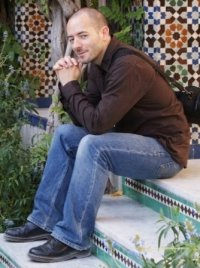Zen weekend
A day and a half is a bit short to call a retreat but it was well worthwhile. Godo Guy Mercier gave an interesting talk about 'Meditation and Everyday Life', then lots of zazen. Fourteen of us slept on the floor of the dojo on Saturday night.
Godo Mercier is a great teacher and a very likeable person - warm, funny and approachable. He gave us some good tips on meditation, emphasising constantly bringing ourselves to observe rather than on stopping thoughts or judging ourselves for daydreaming. He also gave a detailed account of the personal history of an individual human being. I've paraphrased it here:
- In the beginning there was emptiness
- because of desire there was form - a human child
- the child is ultimately empty and is happy as it is
- the parents use stimulation to draw the child's attention, to make it need external things
- to control its relationship with external reality the child creates a barrier of ego
- the ego gets stronger and stronger until as an adult most interactions are just ego interactions
- by cultivating emptiness we can weaken ego and our true natures can be expressed
I had a chance to talk with him face to face afterwards. I asked him what he meant when he said that emptiness was the same as happiness and love. How could this be? Why happiness and not unhappiness...or something else? It seemed to suggest that before I was born I was happy, which is not something I could make sense of. What he said was that this was beyond language and that to understand I should stay with the feeling of happiness I have while practicing zazen. While this might be good pragmatic advice I couldn't help feeling that the answer was a bit of a cop-out intellectually.
Musing on it overnight I spoke to him again to say farewell and suggested that perhaps I was interpreting him as saying that emptiness had the characteristic of happiness, when emptiness could not have characteristics. I suggested that realising emptiness may rather remove all barriers to a natural expression of happiness. He told me I had worked it out on my own, which is good but I shouldn't think too much.
He seems to embody the qualities he talks about. He seems to be compassionate and wise. He has a lot of presence - when speaks to you on a one to one basis he really engages with you, to such an extent that he almost seems to be looking into you. This is just because he is very attentive and aware, very present with what is going on.
Each time I've spoken to him, I've tried to remain 'cool' and to treat him like anyone else, but each time I've failed and have caught myself grinning nervously and nodding like a fool. Hopefully that will wear off.




A lovely post! I'm studying Sartre now, and can't help finding affinities with Buddhism. An author named Steven Laycock has a book about it that I'll soon trudge though.
ReplyDelete"realising emptiness may rather remove all barriers to a natural expression of happiness" - I don't know that I've heard it better put.
I would add that it is not as if the child purposely 'creates' an ego to deal with the world, but that an ego forms from the child's disappointments in the world, as a coping mechanism. Otherwise I think you, and your wise teacher, have it spot-on.
Best wishes from a fellow Justin...
ps - I'm an academic nerd myself, and have been told several times by good teachers not to think too much - It's one piece of advice I still happily disobey as often as I can.
Thanks for dropping by and thanks for your compliment.
ReplyDeleteNishijima has some interesting comments about Buddhism and Existentialism - described as a philosophy of action in his analysis of the Shobogenzo in my recent post on the Genjokoan.
I don't think that thinking is so bad, only too much attachment to our thoughts so that we think our thoughts are reality.
All the best